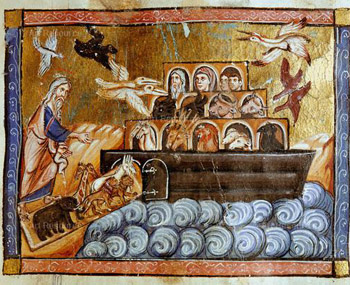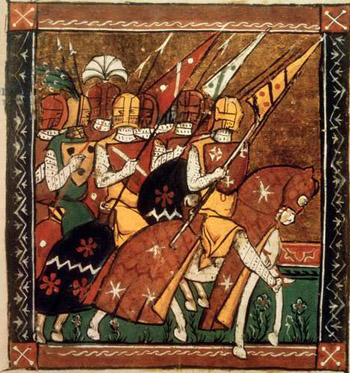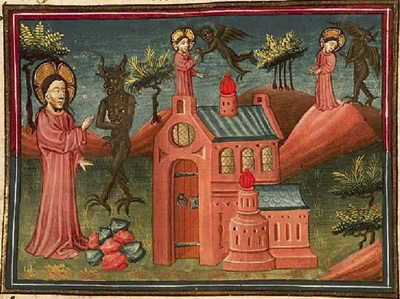Symbolism
 |
 |
 |
 |
 |
 |
 |
The Number 40 Denotes
Punishment & Suffering
We may be sure that a season so sacred as Lent is rich in mysteries. The Church has made it a time of recollection and penance in preparation for the greatest of all her Feasts. She would, therefore, bring into it everything that could arouse the faith of her children and encourage them to go through the arduous work of atonement for their sins.
During Septuagesima, we had the number 70, which reminded us of those seventy years’ captivity in Babylon, after which, God’s Chosen People, being purified from idolatry, was to return to Jerusalem and celebrate the Pasch. It is the number 40 that the Church now brings before us: - a number, as St. Jerome observes, which denotes punishment and affliction. (Ez 29)
 Let us remember the 40 days and 40 nights of the Deluge, (Gen 7:12) sent by God in His anger, when He repented that He had made man and destroyed the whole human race, with the exception of one family.
Let us remember the 40 days and 40 nights of the Deluge, (Gen 7:12) sent by God in His anger, when He repented that He had made man and destroyed the whole human race, with the exception of one family.
Let us consider how the Hebrew people, in punishment for their ingratitude, wandered 40 years in the desert before they were permitted to enter the Promised Land. (Num 14: 33)
Let us listen to our God commanding the Prophet Ezechiel to lie 40 days on his right side, as a figure of the siege which was to bring destruction on Jerusalem. (Ez 4:6)
There are two men, in the Old Testament, who representing their persons the two manifestations of God: Moses, who typifies the Law; and Elias, who is the figure of the Prophets.
 Both are permitted to approach God: the first on Mount Sinai, (Ex 24:18) the second on Mount Horeb. (3 Kings 19: 8) But both of them have to prepare for the great favor by an expiatory fast of 40 days.
Both are permitted to approach God: the first on Mount Sinai, (Ex 24:18) the second on Mount Horeb. (3 Kings 19: 8) But both of them have to prepare for the great favor by an expiatory fast of 40 days.
With these mysterious facts before us, we can understand why it was that the Son of God, having become Man for our salvation and wishing to subject himself to the pain of fasting, chose the number of 40 Days.
The institution of Lent is thus brought before us with everything that can impress the mind with its solemn character, and with its power of appeasing God and purifying our souls.
Let us, therefore, look beyond the little world that surrounds us, and see how the whole Christian universe is, at this very time, offering this 40 Days’ penance as a sacrifice of propitiation to the offended Majesty of God. And let us hope, that, as in the case of the Ninivites, He will mercifully accept this year’s offering of our atonement, and pardon us our sins.
How the Church views her children these 40 days
The number of our days of Lent is, then, a holy mystery. Let us now learn from the Liturgy in what light the Church views her Children during these 40 Days.
She considers them as an immense army, fighting day and night against their spiritual enemies. We remember how, on Ash Wednesday, she calls Lent a Christian Warfare.
Yes, in order that we may have that newness of life, which will make us worthy to sing once more our Alleluia, we must conquer our three enemies: the Devil, the flesh, and the world. We are fellow combatants with our Jesus, for He too submits to the triple temptation suggested to him by Satan in person. Therefore, we must have on our armor and watch unceasingly.
 And, whereas it is of the utmost importance that our hearts be spirited and brave, the Church gives us a war song of Heaven’s own making, which can fire even cowards with hope of victory and confidence in God’s help: It is the Ninetieth Psalm [Qui habitat in adjutorio, in the Office of Compline]. She inserts the whole of it in the Mass of the First Sunday of Lent, and every day introduces several of its verses in the Ferial Office.
And, whereas it is of the utmost importance that our hearts be spirited and brave, the Church gives us a war song of Heaven’s own making, which can fire even cowards with hope of victory and confidence in God’s help: It is the Ninetieth Psalm [Qui habitat in adjutorio, in the Office of Compline]. She inserts the whole of it in the Mass of the First Sunday of Lent, and every day introduces several of its verses in the Ferial Office.
She there tells us to rely on the protection wherewith our Heavenly Father covers us, as with a shield [Scuto circumdabit te veritas ejus, Office of None.]; to hope under the shelter of his wings [Et sub pennis ejus sperabis, Sext]; to have confidence in Him, for He will deliver us from the snare of the hunter [Ipse liberavit me de laqueo venantium,Tierce], who had robbed us of the holy liberty of the children of God.
She tells us to rely upon the succor of the Holy Angels, who are our Brothers, to whom Our Lord hath given charge that they keep us in all our ways [Angelis suis mandavit de te, ut custodiant te in omnibus viis tuis, Lauds and Vespers]. For these Holy Angels were, when Our Lord permitted Satan to tempt Him, the adoring witnesses of His combat and approached Him, after His victory, proffering to Him their service and homage.
Let us, then, enter into these sentiments wherewith the Church would have us be inspired; and during our six weeks’ campaign, let us often repeat this admirable Canticle, which so fully describes what the Soldiers of Christ should be and feel in this season of the great spiritual warfare.
To be continued


Posted March 5, 2021
During Septuagesima, we had the number 70, which reminded us of those seventy years’ captivity in Babylon, after which, God’s Chosen People, being purified from idolatry, was to return to Jerusalem and celebrate the Pasch. It is the number 40 that the Church now brings before us: - a number, as St. Jerome observes, which denotes punishment and affliction. (Ez 29)

The Deluge lasted 40 days & nights
Let us consider how the Hebrew people, in punishment for their ingratitude, wandered 40 years in the desert before they were permitted to enter the Promised Land. (Num 14: 33)
Let us listen to our God commanding the Prophet Ezechiel to lie 40 days on his right side, as a figure of the siege which was to bring destruction on Jerusalem. (Ez 4:6)
There are two men, in the Old Testament, who representing their persons the two manifestations of God: Moses, who typifies the Law; and Elias, who is the figure of the Prophets.

Elias in the desert for 40 days
With these mysterious facts before us, we can understand why it was that the Son of God, having become Man for our salvation and wishing to subject himself to the pain of fasting, chose the number of 40 Days.
The institution of Lent is thus brought before us with everything that can impress the mind with its solemn character, and with its power of appeasing God and purifying our souls.
Let us, therefore, look beyond the little world that surrounds us, and see how the whole Christian universe is, at this very time, offering this 40 Days’ penance as a sacrifice of propitiation to the offended Majesty of God. And let us hope, that, as in the case of the Ninivites, He will mercifully accept this year’s offering of our atonement, and pardon us our sins.
How the Church views her children these 40 days
The number of our days of Lent is, then, a holy mystery. Let us now learn from the Liturgy in what light the Church views her Children during these 40 Days.
She considers them as an immense army, fighting day and night against their spiritual enemies. We remember how, on Ash Wednesday, she calls Lent a Christian Warfare.
Yes, in order that we may have that newness of life, which will make us worthy to sing once more our Alleluia, we must conquer our three enemies: the Devil, the flesh, and the world. We are fellow combatants with our Jesus, for He too submits to the triple temptation suggested to him by Satan in person. Therefore, we must have on our armor and watch unceasingly.

The Church considers her children an immense army fighting their spiritual enemies
She there tells us to rely on the protection wherewith our Heavenly Father covers us, as with a shield [Scuto circumdabit te veritas ejus, Office of None.]; to hope under the shelter of his wings [Et sub pennis ejus sperabis, Sext]; to have confidence in Him, for He will deliver us from the snare of the hunter [Ipse liberavit me de laqueo venantium,Tierce], who had robbed us of the holy liberty of the children of God.
She tells us to rely upon the succor of the Holy Angels, who are our Brothers, to whom Our Lord hath given charge that they keep us in all our ways [Angelis suis mandavit de te, ut custodiant te in omnibus viis tuis, Lauds and Vespers]. For these Holy Angels were, when Our Lord permitted Satan to tempt Him, the adoring witnesses of His combat and approached Him, after His victory, proffering to Him their service and homage.
Let us, then, enter into these sentiments wherewith the Church would have us be inspired; and during our six weeks’ campaign, let us often repeat this admirable Canticle, which so fully describes what the Soldiers of Christ should be and feel in this season of the great spiritual warfare.
To be continued

Christ tempted by the Devil at the end
of his 40 day fast in the desert

Posted March 5, 2021
______________________
______________________











